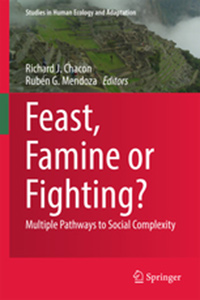 The 481-page book, titled "Feast, Famine Or Fighting?: Multiple Pathways to Social
Complexity," was published this month by Springer Press.
The 481-page book, titled "Feast, Famine Or Fighting?: Multiple Pathways to Social
Complexity," was published this month by Springer Press. Chacon said that newer approaches consider recent archaeological findings and ethnographic
case studies that are transforming the understanding of socio-cultural evolutionary
processes.
Chacon said that newer approaches consider recent archaeological findings and ethnographic
case studies that are transforming the understanding of socio-cultural evolutionary
processes.
ROCK HILL, SOUTH CAROLINA — Winthrop University Associate Professor of Anthropology Richard Chacon co-edited a new anthology that challenges many existing theories on the origins of
social complexity by providing revolutionary new understandings of the rise of social inequality and socio-political evolution.
The 481-page book, titled "Feast, Famine Or Fighting?: Multiple Pathways to Social Complexity," was published this month by Springer Press.
The advent of social complexity has been the subject of longstanding debate among
social scientists, said Chacon. Existing theories and approaches have taken into account
the origins of social complexity that include many factors, such as environmental
circumscription, population growth, technology transfers, organized conflict, wealth
finance, climatological change, transport and trade monopolies, and ideological imperialism.
Chacon said that newer approaches consider recent archaeological findings and ethnographic case studies that are transforming the understanding of socio-cultural evolutionary processes.
"In short, many pre-existing ways of explaining the origins and development of social
complexity are being challenged," said Chacon.
He edited the book with Rubén G. Mendoza, a professor of social and behavioral sciences at California State University, Monterey
Bay. Contributors to the edited volume include a cadre of internationally known scholars.
This work is not only intended for academics but laypersons who are interested in
social inequality and political evolution.
Chacon said the book documents the multiple pathways by which social complexity first emerged on a global scale of analysis. Chapters
in the anthology indicate that some pathways to complexity were predicated on the
exhibition of prosocial behavior such as feasting, whereas others may be understood
as human responses to scarcity of water and food.
By contrast, he said, other pathways were dependent on the use of warfare or some
use of force.
Some of the anthology's contributors advanced the consideration of internal factors
such as multi-ethnic mosaics (cultural diversity) as critical to the development of
complex polities.
The editors therefore stress that this anthology advances new understandings of social complexity and inequality informed by way of groundbreaking findings from
the world over. This is achieved via the inclusion of particularly compelling archaeological
sites and case studies from African, Eurasian and South American regions often neglected
by social theorists.
Themes addressed in turn, include warfare, feasting, egalitarian societies, chiefdoms,
incipient and secondary state formations, internal and external societal dynamics,
status attainment, collective action, social networks of power, long distance trade,
rock art, multiethnic mosaics, corporate interaction, inter-elite interaction, resource
circumscription and the role that ideology may have played in the advent of complex
societies.
For more information, contact Chacon at chaconr@winthrop.edu.